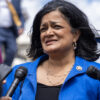Now, not only are we engaged in a War on Terror, but according to the U.S. State Department, apparently a Global War on Censorship. As President Barack Obama extends the hand of reconciliation to distasteful regimes, Secretary of State Hillary Clinton is simultaneously declaring open war on many of these same states’ control of private-media access. Addressing the issue of media censorship in the wake of Google’s well-publicized row with China, Secretary Clinton asserted that, although “new technologies do not take sides in the struggle for freedom and progress, the United States does.”
This seems a hard-tack against the placatory tone of the administration to date, typified by President Obama’s refusal to “meddle” in Iran’s domestic affairs following Iranian elections, until the overwhelming tide of Western sentiment rendered his cherished middle ground absolutely untenable. By the administrations’ own measure, Secretary Clinton’s strategy of what Time Magazine’s Ken Stier calls “actively undermining” foreign government’s ability to limit speech (such as China’s limiting of internet searches) makes “meddling” seem like a minor matter. Though Secretary Clinton’s recognition of the foundational importance of the freedom of speech and the press must be commended, the Obama administration’s inconsistency on this issue threatens the credibility of America’s foreign policy and commitment to liberty.
Though the State Department has begun leveraging more “new technologies” such as internet and mobile phones to as part of its’ overall public diplomacy strategy in places such as Afghanistan, Pakistan and Iraq, Secretary Clinton’s announcement detaches freedom of information from any overall strategy and declares open season on repressive governments world-wide. As Mr. Stier aptly pointed out, China employs over 50,000 government workers controlling China’s cyber space in an effort the United States does not likely have the resources or resolve to counter. This is to say nothing of the repercussions such a carte-blanche assault will have on some of the U.S. more tenuous international relationships.
Getting back to the essential principle that commitment of resources by the State Department should act as part of wider U.S. strategy, subservient to standing U.S. foreign policy. This policy in turn must reflect our commitment to the foundational liberties, such as freedom of expression upon which our society is founded. It is essential, however, that the State Department understand that championing ideals and undermining governments are separate endeavors. We must always commit ourselves to freedom, but intervention against foreign governments should only be approached with utmost prudence.




























